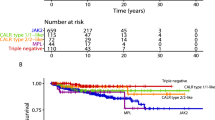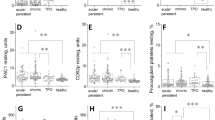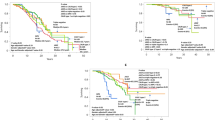Abstract
The efficacy of alfa-interferon (alfa-IFN) in essential thrombocythemia (ET) patients has been reported by several authors. The aim of this study is to assess the magnitude of the effect of alfa-IFN on the neoplastic clone. As of December 1993, 11 ET patients received alfa-IFN at a dose of 3–6 MU/s.c./day for 6 months. Ten of 11 obtained complete hematological remission (CHR) and one achieved partial hematological remission. Megakaryocyte concentration was reduced in six cases. The spleen,which was enlarged in four patients, decreased in size in two patients. Seven of eight patients who were symptomatic at diagnosis obtained resolution of symptoms. In order to obtain indications about the structural modifications induced by alfa-IFN in ET megakaryocytes (Mks), Fourier-transform infra-red microspectroscopy analysis performed on 10 single Mks of each patient, was done in seven of 11 patients; the analysis showed a reduction of A1/A2 ratios (A1 integrated area of the band at 1080 cm−1 due to the nucleic acids absorption; A2 integrated area of the band at 1540 cm−1 due to proteic components absorption) in five cases, and in three of these five patients A1/A2 ratios achieved normal values. After alfa-IFN treatment we did not observe any change in the methylation pattern of DNA from the granulocyte fraction. Our results confirm the efficacy of alfa-IFN in ET patients, and the decrease of A1/A2 ratios in several patients is a demonstration of the depth of the effect of alfa-IFN on the neoplastic clone. The results of clonality studies showed the persistence of clonal hematopoiesis. Whether higher alfa-IFN dose and/or more prolonged alfa-IFN therapy may allow a restoration of polyclonal hematopoiesis remains to be determined and should be explored in future clinical trials.
This is a preview of subscription content, access via your institution
Access options
Subscribe to this journal
Receive 12 print issues and online access
$259.00 per year
only $21.58 per issue
Buy this article
- Purchase on Springer Link
- Instant access to full article PDF
Prices may be subject to local taxes which are calculated during checkout
Similar content being viewed by others
Author information
Authors and Affiliations
Rights and permissions
About this article
Cite this article
Sacchi, S., Gugliotta, L., Papineschi, F. et al. Alfa-interferon in the treatment of essential thrombocythemia: clinical results and evaluation of its biological effects on the hematopoietic neoplastic clone. Leukemia 12, 289–294 (1998). https://doi.org/10.1038/sj.leu.2400931
Received:
Accepted:
Published:
Issue Date:
DOI: https://doi.org/10.1038/sj.leu.2400931
Keywords
This article is cited by
-
Interferon alpha therapy in essential thrombocythemia and polycythemia vera—a systematic review and meta-analysis
Leukemia (2021)
-
The Use of Anagrelide in Myeloproliferative Neoplasms, with Focus on Essential Thrombocythemia
Current Hematologic Malignancy Reports (2016)
-
Interferon-α therapy in bcr-abl-negative myeloproliferative neoplasms
Leukemia (2008)
-
Bone metabolism during interferon-alpha treatment of essential thrombocythemia
Wiener Klinische Wochenschrift (2004)



